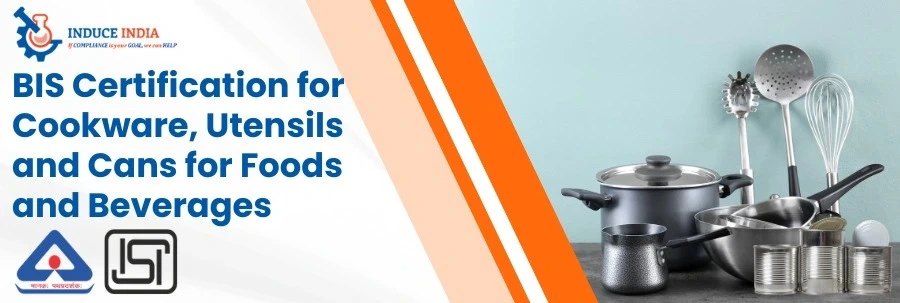BIS Certification stands as a mark of quality, assuring consumers of products that meet stringent safety and quality standards. It is a proof of compliance of products as per specified standards set by Bureau of Indian Standards. For cookware, utensils, and cans used in the food and beverage industries, this certification ensures that they meet set safety and quality standards, protecting consumer health and welfare.
QCO for Cookware, Utensils, and Cans for foods and beverages
MINISTRY OF COMMERCE AND INDUSTRY (Department for Promotion of Industry and Internal Trade) has issued a Quality Control Order (QCO) for Cookware, Utensils and Cans for foods and beverages. This QCO was issued through the Bureau of Indian Standards on 14th March 2024 to make BIS Certification mandatory for Cookware, Utensils and Cans for foods and beverages. The government issues Quality Control Orders (QCOs) which further strengthen the quality assurance framework. QCO specifies the standards and requirements that products must meet before they can be sold in the market. For cookware, utensils, and containers, the QCO ensures that they adhere to specific quality parameters, thereby enhancing consumer trust and confidence.
The implementation date of QCO for Cookware and Utensils
This Order may be called the Cookware, Utensils, and Cans for Foods and Beverages (Quality Control) Order 2024.
The implementation date of this QCO is different based on company scale.
For large manufacturers, foreign manufacturers, or importers it shall come into force on the 1st September, 2024.
For small enterprises it shall come into force with effect from the 1st December 2024 and for micro-enterprises it shall come into force with effect from the 1st March 2025.
Manufacturers can check their company in Udyam Registration of company.
Download full QCO here.
Advantages of BIS Certification
The advantages of BIS Certification for cookware, utensils, and cans are manifold. Firstly, it assures consumers of product safety and quality, instilling trust in the brand and secondly, it enhances market competitiveness by differentiating certified products from others. We can understand by these points:
- Consumer Confidence: BIS certification builds confidence in consumers and assures them that the products they are going to purchase comply with stringent safety standards.
- Market Credibility: Manufacturers benefit from increased market credibility by displaying the BIS standard mark, thereby making their products perceived as safe and reliable. Consumers prefer to buy the certified products in the market.
- Legal Compliance: BIS Certification ensures compliance with regulatory requirements, reducing the risk of legal hassles and product recalls. It ensures that the product is certified and quality control.
- Global Acceptance: If the products are BIS certified it enhances the global acceptance of products, facilitates export opportunities and enhances competitiveness in international markets.
Products covered in QCO for Cookware, Utensils and Cans for foods and beverages
| Goods or articles | Indian Standard | Title of Indian Standard |
| (1) | (2) | (3) |
| Cookware, Utensils and Cans for foods and beverages | 14756:2022 | Stainless Steel Utensils |
| 1660:2009 | Wrought Aluminium Utensils | |
| 13983:1994 | Stainless Steel Sinks for Domestic Purposes | |
| 9396 (Part 1): 1987 | Round Open Top Sanitary Cans for Foods and Drinks- Tinplate | |
| 14407:1996 | Aluminium cans for beverages |
Process for BIS Certification for Cookware, Utensils and Cans for foods and beverages
The process for BIS Certification involves several stages, including application submission, testing, and evaluation. The BIS Certification process for Cookware, Utensils and Cans for foods and beverages is different for domestic manufacturers and foreign manufacturers or importers. Here is a general overview of the BIS process:
- Identification of Standards for the product being certified
- Preparation of Documents
- Submission of Application to the BIS portal
- Scrutiny of Documents
- Sample Testing in the BIS-approved laboratory
- Audit by BIS Officer on manufacturing location
- Grant of License
To know more about the process of BIS Certification for Cookware, Utensils, and Cans for foods and beverages visit here.
Compulsory Use of Standard Mark
The compulsory use of the Standard Mark on certified cookware, utensils, and cans is pivotal in ensuring consumer awareness and product credibility. Manufacturers must display the Standard Mark (ISI Mark) on products as per their specified IS numbers. As mentioned in the QCO, If any person (manufacturer or importer) who contravenes the provisions of this Order shall be punishable under the provision of BIS Act, 2016.
Conclusion
In conclusion, BIS Certification for cookware, utensils, and cans for foods and beverages is not just a regulatory requirement but a testament to a manufacturer’s dedication towards quality and safety. By obtaining BIS Certification, manufacturers uphold consumer trust, gain market advantage, and contribute to a healthier and safer society.
If you are a manufacturer or importer of cookware, utensils, and cans for foods and beverages and looking for BIS Certification, It is always beneficial to get assistance from a BIS Consultancy. If you get assistance from a BIS consultancy, it will save your time and money. Induce India is one of the best BIS Consultants in India. Induce India will guide you from the identification of your product standard to grant of a license.
For more information about the QCO for cookware, utensils, and cans for foods and beverages or BIS Certification feel free to contact us.



